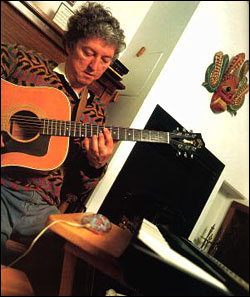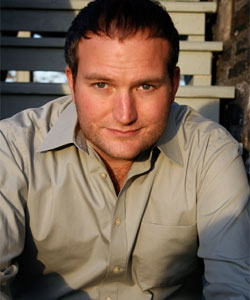You won’t see them wearing Dalympics T-shirts and taped to telephone poles for Shinerama. But there are dozens of professors new to Dal who are lost in the stacks at the Killam or inquiring desperately about what time Tim Hortons closes.
Dalnews introduces you to a few of the faculty frosh behind the lectern in your classroom:
 |
| Scott Macmillan, composer, musician, teacher. |
Scott Macmillan
Department of Music
In the Department of Music, the new guy is an old hand. Scott Macmillan is one of the Atlantic region’s leading musicians, known for his astounding versatility in the fields of classical, pop, jazz, blues and Celtic music.
Equally at home behind the podium, in the studio or strumming a guitar, Mr. Macmillan is in demand as a music director, performer, conductor, arranger and producer.
And now as a teacher too. A Dal grad with a degree¬Ýdouble major in¬Ýmath and music, Mr. Macmillan will teach guitar one-on-one to several students and lead the guitar ensemble. But he‚Äôs most looking forward to teaching The Guitar: History and Techniques (), a class designed as an elective for non-music majors.
It sounds noisy—students of varying musical ability bring their guitars to class and spend the majority of the time simply playing. They learn strumming, basic chords and the history behind plucked instruments.
“I love it,” assures Mr. Macmillan. “All the students are so keen to learn. A big reward for me is seeing all the light bulbs switch on.”
Through the fall, you can catch Mr. Macmillan with his 12-piece jazz ensemble Scott ‘n’ the Rocks every other Monday at Stayner’s Wharf on the Halifax waterfront. As one-half of The Guitar Wizards, he’ll also perform with Brian Doyle for several dates next month in Cape Breton.
D'Arcy Gray
Department of Music
 |
(Danny Abriel Photo) |
Bongos, congos, timpanis, glockenspiels and marimbas. Percussionist D’Arcy Gray plays anything you hit.
“I can’t wait to get my fingernails all dirty down in the basement of the Dal Arts Centre,” says Mr. Gray, another new face in the Department of Music’s staff room.
After 20 years based at McGill University in Montreal – first as a student, then as a teacher – he’s returned home to Nova Scotia. He’s been on the road a lot, working as a soloist and teacher in Canada, the United States, Europe and South America. After all that travel, he says he’s looking forward to “settling down a bit.”
At ¬È∂π¥´√Ω, he‚Äôll teach percussion students one-on-one and lead the percussion ensemble. He also plays with the Fredericton-based Motion Ensemble, an eclectic chamber music group, and suddenlyLISTEN, a collective of artists brought together by cellist Norman Adams.
“It’s wonderful to be back and reconnecting with old friends,” says Mr. Gray, originally from the Amherst area.
Matthew Schnurr
International Development Studies
 |
(Danny Abriel Photo) |
When Matthew Schnurr says he’s passionate about teaching, the glint in his eye tells you he isn’t exaggerating. On the eve of the first day of the academic year, he was raring to get into the classroom.
He’s already anticipating an exercise he’s prepared for the class Environment and Development (): a simulated negotiation at a meeting of the Convention of Biological Diversity. Students will assume the roles of different stakeholders—countries, multinational companies, NGOs—and prepare position papers on whether the conversion of land for bio-fuel production should be encouraged or not. Lately, bio-fuel (food crops such as corn and soybeans converted into fuel) has been seen as both environmental savior and villain—it all depends on your point of view.
“It’s a really great way to achieve a very thorough discussion of all the issues involved,” he says of the exercise which isn’t planned until later in the term. He is also teaching Community Development (INTD 3104).
He’s willing to take risks with his teaching, mixing in debates, role playing and games to shake up the typical lecture format. “By attempting things that are a little unconventional, you take the gamble that some things will fall flat. But, on the other hand, some will hit home and become memorable.”
With a focus on Africa, his research is about “connecting contemporary development to its history.” The Toronto native recently defended his PhD thesis dissertation at UBC, on the political ecology of agricultural failure in South Africa. “That’s what fascinates me, to examine environmental problems through a political lens.”
Alexander Treiger
Religious Studies, Department of Classics
 |
| Alexander Treiger. |
Good luck if you want to add a Religious Studies class to your timetable—many of them are full or getting there fast. And that’s going to keep new professor Alexander (Sasha) Treiger hopping.
This year, he’s teaching Intro to Western Religions (), Islam (), Judaism () and Sufism (RELS 3012).
With religion continuing to dominate the news—from Sarah Palin’s religious-based politics in the U.S. to ongoing religious tensions in the Middle East—it’s no wonder students are signing up and wanting to learn more.
“Or they may be religious themselves and want to know more about their religious traditions and their cultural background,” explains Dr. Treiger.
But he adds the academic’s interest in religion is different from the believer’s interest, who is wondering how religious texts and rituals apply to his or her life. “As an academic, I am trying to understand the concerns of the people who wrote the text. Why was it written? What does it reflect? What kind of society does it come from? There are many, many questions to explore.”
Born in Russia, Dr. Treiger has a BA (Arabic and Islamic Studies) and MA (Comparative Religion) from the Hebrew University of Jerusalem and his PhD (Near Eastern Studies) from Yale University. His research interests lie in Islamic studies.
Michelle Adams
School of Resource and Environmental Studies
 |
(Danny Abriel Photo) |
Michelle Adams finds it both intimidating and inspiring that she occupies the office of her mentor, the recently retired Ray Coté.
“When someone says, ‘Oh, you’re the new Ray,’ I cringe. I mean, he has shoes this big…” she indicates a Michael Phelps foot span with her hands, “and I have little feet.”
It was Prof. Cot√© who lured her away from the private sector and into the halls of academe. After seeing him lecture, she started taking classes at ¬È∂π¥´√Ω and then took on a PhD investigating why businesses were reluctant to invest in clean technologies when they would lessen environmental damage and save on the bottom line.
As an environmental engineer, she spent much of her time figuring out how to clean up sites after they’d been contaminated. The idea that waste could be regarded as a fuel source or a raw material for another company just wasn’t anything she saw in practice.
“What a concept: don’t create it in the first place. Whatever you want to call it—waste, pollution, contamination—someone’s paid for it at the front end. So from a business standpoint, you have to figure out how to get economic value from the material you used to dump down the drain.”
Prof. Adams is teaching some graduate level courses as well as acting as the interim director of the Eco-Efficiency Centre.
Darryl Whetter
Creative Writing program, Department of English
 |
(Photo courtesy of Darryl Whetter) |
As a creative writer, the journey is often painstakingly slow. You write a few words, scratch them out, write them again and then think of something even better to replace them with.¬Ý
No wonder then that it took Darryl Whetter more than 10 years to write his debut novel, The Push & the Pull (Goose Lane Editions). It‚Äôs fitting that his book is a road story taken on a touring bicycle; the saddle sores are worth it in the end.¬Ý
Encouraging students to be editors is as integral to the creative process as the actual writing. That’s what Dr. Whetter advises as the new creative writing professor in the English department.
He’s thrilled to be teaching Creative Process (), a class open to students of all disciplines that focuses on creativity in a wide variety of artistic expressions, such as writing, painting, music, dancing, mathematics and advertising.
“I’m looking for a radical willingness for students to revise and revise and change,” he says, calling writing “the art of difference.”
Besides teaching this fall, the cycling professor is running for the Green Party in the Halifax riding during the October 14 federal election.
